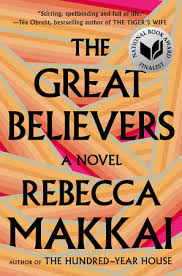Rebecca Makkai
Viking

|
No one wanted to do much in the weeks after Nico’s memorial. Whoever you called was busy taking food to Terrence’s place, or you yourself were taking food to Terrence. Or people were sick, just regular sick, with coughs brought on by the drop in temperature. Guys with families flew home for Thanksgiving to play straight for nieces and nephews, to assure their grandparents they were dating, no one special, a few nice girls. To assure their fathers, who had cornered them in various garages and hallways, that no, they weren’t going to catch this new disease. from The Great Believers |
A portrait of grief's lasting scars
We are coming up on the fortieth anniversary of when AIDS (Acquired Immune Deficiency Syndrome) first appeared on the nation’s radar. In 1981, numbers of young gay men in New York City and San Francisco began mysteriously falling ill and dying without a known cause. Rebecca Makkai’s The Great Believers, a finalist for the 2018 National Book Award, revisits this painful period in our recent history.
In the 1980s, Fiona Marcus is a teenager who adores her older brother Nico. She becomes part of his world, dazzled by his witty and talented friends. Among them is Yale Tishman, a development director for a university art museum. When Nico dies from AIDS, Fiona and Yale support each other through the ensuing years of loss—“Nico’s friends, who’d become her only friends, dying one by one and two by two and, if you looked away for a second, in great horrible clumps.”
In powerful and poignant scenes Makkai captures the tenor and tone of that time: the fear and uncertainty, the layering of losses, the frustration with the Reagan administration’s willful negligence and inaction—In spite of health authorities calling for urgent federal action, it wouldn’t be until the Clinton administration that it was even acknowledged there was a national health crisis and appropriate levels of funding provided, a decade after the epidemic had appeared. By then, a half million Americans had become infected and three hundred thousand had already died.
The chapters alternate between the harrowing years of the 1980s and 2015, when Fiona, now in her fifties, has traveled to Paris, searching for her estranged daughter, Claire. These two storylines—re-living the plague years and searching for Claire—become parallel tracks that at last converge in Fiona’s mind as she realizes how her grief has limited her from loving anyone for fear of again losing that person, limited her even in loving her own daughter.
We would like to think that people “get over” their deepest losses and “move on” with their lives. And people do, carrying their grief quietly, hidden away in their secret hearts. But, as Fiona comes to realize, getting over her losses and moving on with her life is not the same as healing. For our deepest losses, “the best (one) could hope for was good scarring.”
Alan’s novel about the AIDS epidemic, As If Death Summoned, will be published in December 2020 by Amble Press, an imprint of Bywater Books.
This review first appeared in The Columbia River Reader (April 15-May 15, 2019.) Reprinted with permission.

